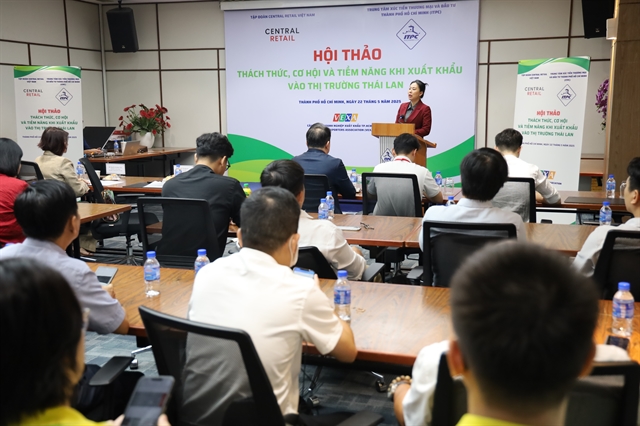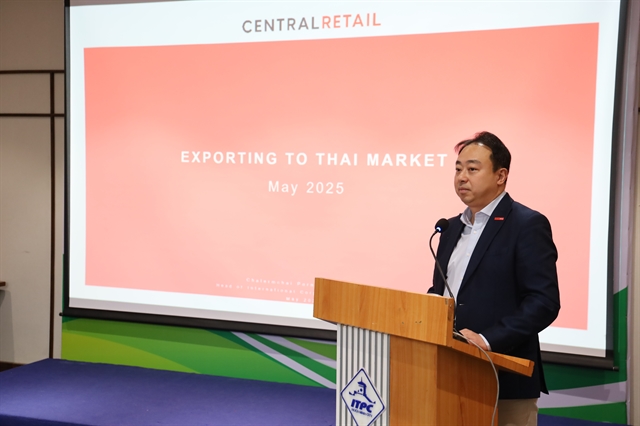 Economy
Economy


|
| Attendees at the conference in HCM City on Thursday. — Photo courtesy of ITPC |
HCM CITY — With over 70 million people with growing purchasing power, Thailand is a promising market for exports, but to succeed, Vietnamese businesses must improve product quality, understand consumer trends and develop long-term strategies, a conference heard in HCM City on Thursday.
Speaking at the conference, Hồ Thị Quyên, deputy director of the Investment and Trade Promotion Centre of HCM City (ITPC), highlighted the robust growth in economic relations between Việt Nam and Thailand, which form a crucial pillar of their strategic partnership.
Thanks to geographic proximity and strong transport links via the East–West and Southern Economic Corridors, the two countries have bolstered trade, investment and logistics ties.
“Thailand remains Việt Nam’s largest trading partner in ASEAN, while Việt Nam is Thailand’s second largest,” Quyên said.
Trade agreements such as the ASEAN Trade in Goods Agreement and the Regional Comprehensive Economic Partnership have helped reduce tariffs, while enabling businesses on both sides to build supply and production chains and expand into third countries.
The recent upgrade of Việt Nam–Thailand ties to a comprehensive strategic partnership marks a new phase of collaboration, she said.
In 2024, bilateral trade reached US$20.26 billion after increasing by 6.36 per cent.
Việt Nam exported $7.81 billion worth of mostly mobile phones, machinery, electronics,, and agricultural products.
In the first quarter of 2025, trade value reached $5.17 billion, up 8.36 per cent.
The two countries aim to grow annual trade to $25 billion, with a focus on balance and sustainability.
Quyên said Thailand is a key partner for HCM City, especially in trade, investment, culture, and tourism, and the city would continue to support businesses seeking entry into the Thai and broader ASEAN markets.
“To effectively penetrate the Thai market, Vietnamese enterprises must overcome technical barriers, intense competition and changing consumer preferences.
“This requires businesses to improve product quality, stay updated with market trends and develop sustainable business strategies.”
Nguyễn Thị Bích Vân, communications director at Central Retail Vietnam, said nearly 500 Vietnamese businesses have showcased their products to Thai consumers since 2016 through the annual “Vietnamese Goods Week in Thailand” organised by her company, the Ministry of Industry and Trade and ITPC.
The event has enhanced export opportunities and facilitated business-matching activities that enabled seasonal fruits such as lychee, longan and dragon fruit to be regularly exported to Thailand through Central, Vân said.
Last November, Central Retail Vietnam and ITPC held the first “Vietnamese Goods Week” in Udon Thani, a Thai province with a large Vietnamese community, featuring agricultural products, processed foods, tea, coffee and handicrafts.
Vân pointed to the signing of a cooperation deal for 2026–28 between the ministry’s domestic market development agency and the foreign market development department and Central during Thai Prime Minister Paetongtarn Shinawatra’s visit to Việt Nam on May 16 to boost production and consumption of Vietnamese goods both domestically and abroad.
It would enable Central to continue assisting Vietnamese businesses with expanding into international markets, she added.

|
| Chailermchai Pornsiripiyakool, head of international corporate affairs and CSR at Central Retail Vietnam, speaks about Thai import regulations at the conference. — Photo courtesy of ITPC |
Chailermchai Pornsiripiyakool, head of international corporate affairs and CSR at Central Retail Vietnam, said seafood, sweet potato, dragon fruit, coffee,and cooking sauces are the Vietnamese products that could become popular in Thailand.
He suggested that businesses looking to enter the Thai modern trade market improve packaging to be attractive, modern, and compliant with international standards and labelling regulations, reflect green trends, offer competitive pricing supported by seasonal promotions, and provide clear product information.
He also discussed Thai import regulations, highlighting that for food items, businesses must obtain a food import licence by providing detailed documentation on ingredients and intended use.
Specific requirements vary by product type, he added. — VNS




